Since April of last year, and the onset of the pandemic, Brooklyn, like the rest of New York, has been put on indefinite hiatus regarding curbside pickups of its organic waste, with the closure of Brooklyn composting drop-off sites exacerbating the problem. Worse still, according to the latest news from the DSNY, the service suspension is planned through June 2022, leaving New Yorkers with little choice other than to landfill food scraps and organic waste.
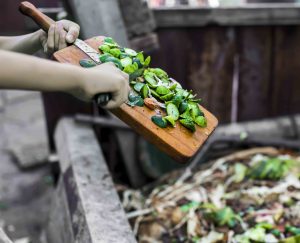
For businesses, however, little has changed, and the latest amendments to the commercial organics requirements made in July 2020 remain in force, requiring food service establishments, retail food stores, wholesalers, and manufacturers to enlist the services of food waste haulers in Brooklyn to collect and divert food waste away from landfill.
The problem for sustainably-minded residents of the borough is that leaves a whole load of residential food waste going to…well…waste. For many people, the sudden removal of Brooklyn food scraps collection services has left a big hole in their sustainability goals and aspirations.
However, resourceful Brooklynites have stepped up to the challenge, and even with current restrictions on movement and social contact, there’s a whole host of initiatives popping up across the borough to help residents reduce, reuse, and recycle food waste. Here, we look at exactly what’s happening on the ground in Brooklyn when it comes to composting and diverting food waste.
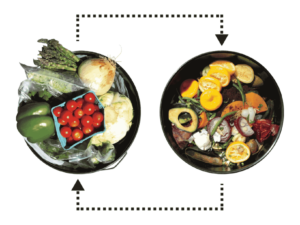
Source: groundcycle.org
Closing the loop between compost and produce
In a single swoop, Groundcycle.org has closed the loop of food waste and healthy, farm-fresh produce for residents of Brooklyn. Founded in the midst of the pandemic, Vivian Lin saw farmers’ produce go to waste when it couldn’t be distributed through usual channels, this, combined with the DSNY’s decision to end curbside collection of organic waste, presented the perfect synergy for her Groundcycle project.
Offering a door-to-door service that delivers a weekly or bi-weekly basket of fresh veggies, the company also collects your food scraps at the same time, delivering them back to the farmers who will then turn them into compost to grow your next batch of fresh cherry tomatoes.
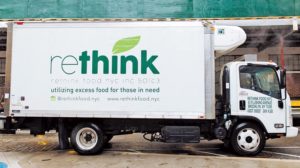
Source: totalfood.com
Ending food insecurity using restaurant “waste”
Another organization responding directly to the challenges of the current situation is Rethink Food, a non-profit founded in April 2020 that utilizes restaurant “waste” to prepare nutritious meals for those most in need. With more than 2 million meals served to date from more than 35 Rethink Certified Restaurants, Rethink is not only feeding food insecure Brooklynites, but also supporting restaurants during these difficult times, helping them to stay in business by supporting a portion of operation and staffing costs.
In addition to the collection and preparation of meals, Rethink also operates its own donation-based café, serving delicious meals with recovered produce from its partner restaurants.
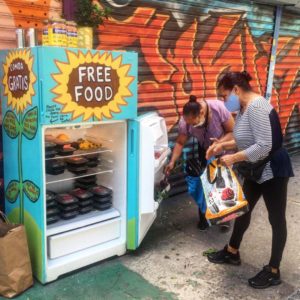
Source: instagram.com
Catering for residents with community fridges
As grassroots as it gets, community fridges are popping up all over Brooklyn, and indeed New York. There are numerous concepts behind this citizen-led initiative, with some providing fresh produce from local farmers, some stationed outside stores that are then stocked with the day’s remains, and others working on a “take what you want, leave what you don’t” basis.
Accessible to anyone who either needs food or wishes to donate unwanted food, these fridges are proving to be highly successful, and they are ensuring plenty of produce that might otherwise go to landfill is instead going to those in need. Additionally, as a community-driven movement, anyone is free to participate, setting up fridges across the city to make a tangible difference to many people’s quality of life.

Source: toogoodtogo.com
Apps leading the way in food waste reduction
European-based Too Good to Go is an app that connects users with restaurants, cafes, grocery stores, and food stores, providing a smartphone-based experience that lays out what produce is available and where. Thankfully for Brooklynites, the app launched in New York back in October, and it has been something of a revelation, with thousands signing up in the first month.
The premise is simple, users download the app which then uses geo-location tech to identify which businesses are offering “waste” food items that are either given away for free or at highly discounted prices. All you have to do is turn up and grab your chosen items or take your chances with a “surprise bag”!
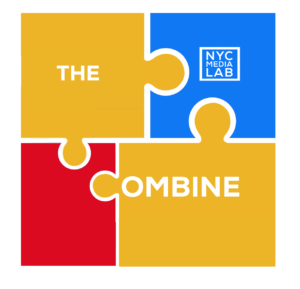
Source: nycmedialab.org/a>
Advanced composting tech at NYU Tandon campus
Ph.D. candidate Deniz Vurmaz of the NYU Tandon campus in Brooklyn has high hopes for her AI-enabled biodigester technology to revolutionize the world of composting once the pandemic has passed.
Using proprietary biodigester machinery that significantly reduces the space needed to turn food waste into compost, the system works anaerobically and collects data on nutritional content among other important soil metrics. In layman’s terms, the concept is to produce the highest quality compost in even the smallest spaces—such as a New York apartment—allowing residents to compost in Brooklyn (and beyond) cleanly and efficiently even at home.
Whether at the grassroots level, as a non-profit or innovative organization, it is clear that Brooklyn is committed to delivering real change when it comes to food waste, regardless of the existing situation. This new-found emphasis from Brooklynites, in combination with the borough’s many businesses, is exactly what NYC needs to reach its sustainability goals— moving past today’s multifaceted challenges into a brighter and more sustainable future.
For more information on how your business can help in the fight against food waste, contact our TRUE Advisors today to discuss your specific requirements. Additionally, subscribe to the RTS blog for more news and insights on waste management and sustainability.

